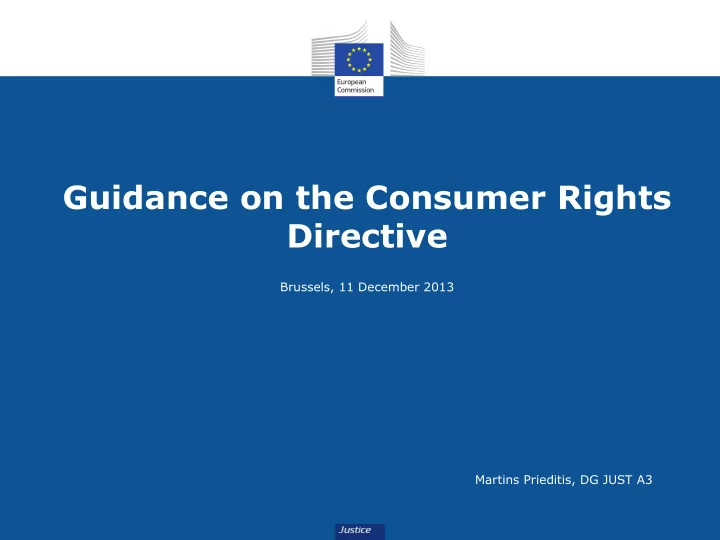

Guidance on the Consumer Rights Directive Brussels, 11 December 2013 Martins Prieditis, DG JUST A3
CRD – implementation process • Transposition deadline – 13 December 2013 • Since September 2012 – three multilateral meetings with Member States' experts in charge of the transposition and bilateral contacts • As of today, 11 December – 4 notifications of transposition (Greece, Germany, Cyprus, Lithuania) • The National transposition measures to apply to contracts concluded as from 13 June 2014 • Until then, time for adaptations by businesses • Guidance from the Commission to facilitate uniform application across the EU
State of transposition at EUR-Lex
+ Information on regulatory choices (Article 29) http://ec.europa.eu/justice/consumer-marketing/rights-contracts/
Classification of contracts • The CRD distinguishes between: • Sales contracts • Service Contracts • Contracts for the supply of water, gas, electricity and heating (utilities) • Contracts for digital content not supplied on a tangible medium (with a broad definition of "digital content") • Consequences of the classification: • the starting point of the right of withdrawal period (either delivery of goods or signature of contract) • Only sales and service contracts are subject to the condition of payment of price by the consumer to fall under the CRD • Challenges: • Classification of contracts covering both goods and services • Classification of contracts for online services (cloud storage, communication applications, subscriptions etc.)
Pre-contractual information • General requirements: • Criteria for assessing clarity and comprehensibility • Interplay with information requirements in other EU legislation • Application of pre-contractual information requirements to: • contracts transferred between consumers, such as users of utilities services (electricity, heating etc.) • Contracts for "day-to-day" transactions (possible exemption)
Off-premises contracts • The CRD further distinguishes between: • off-premises contracts • distance contracts • Other contracts, i.e., contracts concluded on trader's business premises • Classification of movable business premises • The scope of "off-premises" contracts under the CRD is broader than the scope of the current Doorstep Selling Directive 85/577/EEC • Challenge: classification of retail premises according to the criteria of "permanent" or "usual" (seasonal) use, in particular the case of market and fair stands and temporary "pop-up" stores
Distance contracts • Article 8(2) – essential information requirements • Solutions to provide information clearly and prominently and directly before placing the order • Application to repetitive purchases in the context of a subscription, for example to a video game • Acknowledgement of the obligation to pay • Article 8(4) – special regime for means of distance of communication allowing limited time and space • Scope of application – technologies limiting the amount of information that can be supplied (SMS contracts, other?); trading websites specifically customised for devices with small screens • Article 8(7) – confirmation of contract on durable medium • Possible non-delivery of confirmation e-mail • Use of customer's private online accounts with the trader
Right of Withdrawal • Different calculation of the withdrawal period depending on the classification of the contract • Different procedures and consequences for withdrawal from sale/provision of: • Goods – consumer's right to examine them but liability for diminished value • Services – consumer's right to request immediate performance keeping the right of withdrawal subject to payment of compensation; no right of withdrawal from service contracts after service fully performed • Utilities (electricity, gas etc.) – compensation regime as for services • Online digital content – no right of withdrawal if performance started
Right of Withdrawal – sale of goods • Scope of the right to examine the goods • Liability for the diminished value • Evaluation of the diminished value • Enforcement of the liability • Partial withdrawal and withdrawal after receiving replacement goods • Return of goods and reimbursement • Passing of risk in returning the goods • Interpretation of "evidence" of having sent back the goods • Use of different means of payment for reimbursement • Offer by the trader to collect the goods / trader's agreement to bear the cost of return • Information about the cost of return
Withdrawal in respect of goods – Exceptions • Personalised goods and goods made to specifications (Article 16(c)) • Goods involving many standard options manufactured upon order • Contracts with specific date or period of performance (Article 16(l)) • Application to long-term contracts - role of the capacity reservation and the objective difficulty to fill the capacity in applying this exception
Right of Withdrawal – services/ utilities • Loss of the right withdrawal from service contract when contract fully performed • Implementation of the consumer's acknowledgement • Consequences of trader's failure to get it • Application of the compensation regime (Article 14(3)) • Implementation of the consumer's "express request" for immediate performance • Termination of the contract in case of withdrawal
Right of Withdrawal – online Digital products • The withdrawal regime depends on the classification of the online digital product as "service" or "digital content": • For services – right of withdrawal even in case of immediate performance subject to compensation • For "digital content" – no right of withdrawal in case of immediate performance, provided requirements are met by the trader (Article 16(m)) • Acquiring consumer's express consent and acknowledgement for immediate performance of digital content • Consequences of failure to comply with requirements for immediate performance (Article 14(4)(b)): • Sanction provided in case of not confirming the consent and acknowledgment even if no more right of withdrawal under Article 16 (m)
Horizontal issues (all contracts) • Delivery (Article 18) • Trader's obligation to reimburse payments in case of non-delivery "without undue delay" • Fees for the use of means of payment (Article 19) • Interaction with the rules on payment services • Eligible costs to justify fees charged to consumers • Treatment of trader's internal (administrative) costs for processing payments • After-sales telephone contacts (Article 21) • Criteria for identifying calls charged at "basic rate" • Prohibition to use pre-ticked boxes for additional payments (Article 22)
Thank you for your attention Comments/ suggestions welcome to: just-communication-A3@ec.europa.eu by 10 January 2014
Recommend
More recommend